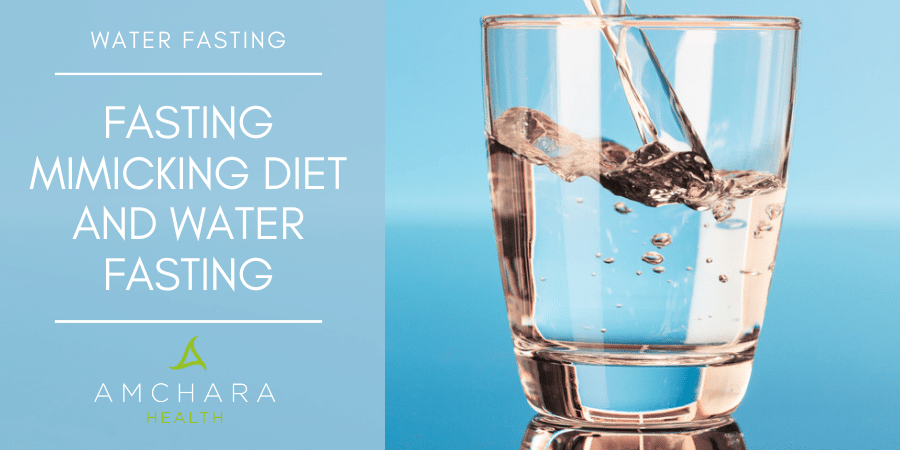Fasting is all the rage these days due to a swathe of highly published research that proves the numerous health and weight loss benefits associated with restricting food intake.
There are many different types of fasting methods, the more popular being intermittent fasting, time restricted fasting, juice fasting and water fasting.
However, the fasting mimicking diet (FMD) which may not be as well known, is gaining popularity.
This ‘pretend’ fast appears to have all the health benefits of water fasting but none of the hardship.
Artilce Index:
Origins of Fasting
Fasting is an ancient healing tradition that has been practised by virtually all cultures and religions for centuries.
References to fasting can be found in the Bible, the Koran and in ancient Greek texts and was often referred to as cleansing or purifying.
Hippocrates – considered the father of modern medicine, championed fasting as part of the natural therapies he recommended.
Animals in a natural environment instinctively turn to fasting when they feel ill, curing themselves with sunlight, fresh air, rest and fasting.
Humans, like most animals, also have no desire to eat when they become sick.
Perhaps this is why fasting is known as the ‘physician within’, or as Arnold Ehret called it – nature’s bloodless operating table.
Aside from the religious and spiritual significance fasting has been used by physicians throughout millennia as a therapy for numerous health conditions.
The belief being that nature is the greatest healer and the body has its own innate healing powers that can prevent disease and regain good health.
By fasting we tap into something that is deeply, intrinsically beneficial to the body and spirit.
Naturopaths uphold this belief, maintaining that fasting enables nature to perform a cleansing in the body without being hindered by the additional load of food to digest.
Therefore the digestive organs are given a well needed rest, enabling the body to detoxify, carry out repairs and work more efficiently.
Recent research has identified that fasting triggers adaptive cellular responses that reduce oxidative damage and inflammation as well as optimizing energy metabolism.
According to animal studies intermittent or periodic fasting – as practised with water fasting or FMD protects against diabetes, asthma, obesity, high blood pressure multiple sclerosis and rheumatoid arthritis.
It also has the potential to delay ageing by reprogramming metabolic and stress resistance pathways.
The Value of Water Fasting
Cleansing and fasting are integral to a holistic approach to healing as practised by many complementary and alternative health practitioners.
Naturopathic medicine honours the body’s innate wisdom to heal, utilizing the most natural, least toxic and least invasive therapies to treat ill health and promote wellness.
Cleansing and detoxifying by fasting is part of a naturopaths toolbox and where appropriate water fasting may be employed to encourage healing.
Many health problems today are associated with dietary excesses, in particular sugar, animal fats and animal proteins as well as smoking and the use of alcohol, caffeine and refined food products.
Making dietary and lifestyle changes can help to reduce the likelihood of medical intervention, however many people find it difficult to adhere to long term diet and lifestyle changes.
Fasting in a safe and supported environment can produce rapid changes that could help some individuals to get back on track to healthy living, and may also enable some to break free from patterns of emotional eating.
What Does Water Fasting involve?
Water only fasting, by definition is the withholding of all substances except pure water for spiritual, health, or other reasons in an environment of complete rest.
Exercise is discouraged to preserve energy and allow optimum adaptation to the fasting state.
The fast can last for anything from half a day up to as much as 40 days.
Water fasting is designed to give a break to the digestive system, freeing up energy so the body can repair itself.
The quantity of water ingested during a fast is determined by thirst. It is important to drink several glasses of water daily to prevent dehydration – between 9 to 13 cups are recommended.
What are the Benefits of Water Fasting?
Therapeutic water fasting provides an opportunity for the body to re-boot itself by removing irritants, whether they be food, drugs, microbes or toxins and give the body time to heal itself.
We are constantly exposed to toxins, from the air we breathe to the food we eat and even as a by-product of metabolism.
These toxins cause irritation and inflammation throughout the body.
It is now known that chronic inflammation is the cause of many of the modern world’s common diseases, diabetes, cancer, arthritis, obesity etc.
Water-only fasting encourages a unique biological adaptation which produces a rapid healing response.
This can be quite vigorous which is why fasting can sometimes be an intense and often unpleasant experience.
The body is able to rapidly eliminate toxic products, so changes appear very quickly.
What might normally take months with careful feeding can happen within days or weeks with water fasting.
However, fasting should not be seen as a cure it is a powerful and effective tool that may facilitate the body’s own healing mechanism.
There are several documented benefits these include:
-
Weight loss
-
Normalisation of blood pressure
-
Normalisation of blood glucose
-
Normalisation of cholesterol levels
-
Improvement in circulation
-
Remission of type 2 diabetes
-
Reduction in side-effects of chemotherapy
-
Reduced risk of cancer & cardiovascular disease
-
Reduced risk of heart attack and stroke
-
Reduction in back and neck pain
How Long Should You Fast?
Short-term water fasts last between three and five days.
Prior to fasting you should undergo a physical examination by a qualified doctor or naturopath to ensure your safety during the fast.
Some tests may be carried out and medications or chronic illnesses will be considered before commencing a fast.
Longer fasts can be beneficial in terms of chronic illness, but in these cases supervision by a qualified practitioner or physician is essential in order to continually monitor your health.
Possible Side Effects
Fasting creates a situation whereby there are low concentrations of toxic waste in the circulation.
This is sensed by the plasma membrane of each cell which triggers the cells to release their toxic waste.
Fasting causes this to happen suddenly which can result in mild systemic toxaemia as the system attempts to cleanse itself.
During fasting you might expect to experience brief but mild side effects which may include:
-
Headaches
-
Nausea
-
Dizziness
-
Heart palpitations
-
Coated tongue
-
Bad breath
-
Diarrhoea
-
Bloating
-
Joint pain
-
Skin rashes
-
Irritability
-
Depression
Normal bodily reactions to fasting include reduced blood pressure and heart rate, and a decrease in body temperature and respiratory rate.
This is part and parcel of the body’s attempts to conserve energy.
It appears that the most difficult part of fasting is between 18 and 48 hours after withdrawing food.
This is when the body is experiencing the change from carbohydrate burning to fat burning.
Safety Issues
Fasting is not appropriate for everyone.
This includes pregnant individuals or those at or under ideal body weight.
Patients with extreme weakness, some types of cancer, kidney problems, psychological disorders, anorexia, bulimia or eating disorders, as well as the elderly and very young children.
Long term strict water fasting may also carry a risk for heart failure.
This is because the body’s cellular stores of electrolytes that are necessary for heart function like potassium and magnesium become depleted throughout the fast even though levels in the blood may remain normal.
Ultimately this can lead to organ dysfunction – increasing the chances of a fatal reduction in cardiac, immune or renal function.
It may be possible to avoid this by supplementing with the electrolytes: sodium, potassium, phosphate, calcium and magnesium during long-term water fast.
These minerals are essential for balancing fluid levels in the body and may also prevent one of the biggest dangers of extreme fasting: ‘Refeeding syndrome’.
Breaking the Fast
Refeeding syndrome is a potentially fatal condition that can happen if you rapidly introduce too much food following an extended water fast.
Suddenly changing from ketosis (where the body burns fat for energy) to carbohydrate based foods triggers a rush of insulin from the pancreas which helps the body to utilise the carbohydrates.
For this to happen the body draws upon large quantities of phosphate, magnesium, potassium and several vitamins, which can lead to acute deficiencies resulting in heart failure, hypotension and sudden death.
It is therefore extremely important to break the fast correctly.
Ideally the first two days following a fast should include easily digested foods, beginning with juices, then raw vegetables and fruit, followed by a variety of cooked and raw whole foods. High fat foods are not recommended initially as these may not be well tolerated straight after a fast.
The Fasting Mimicking Diet (FMD)
Water – only fasting can be hard for people to stick to and if not carried out under the supervision of trained health practitioners, it can be potentially dangerous, especially in combination with different types of drugs such as metformin, insulin etc.
The FMD offers the same health benefits of a water only fast but without the risks or hardship.
Scientist Valter Longo, a professor in Gerontology and Biological Science at the University of Southern California, has developed a complex diet that triggers extreme metabolic changes in the body. These mechanisms promote the same health benefits and anti-ageing effects associated with water fasting.
Professor Longo is considered a worldwide leading expert on prolongation of lifespan and longevity – his fasting mimicking diet has been rigorously researched, which makes it a very attractive option for those who want to improve their health, live longer and potentially lose weight into the bargain!
The FMD regime has been shown to reduce insulin-like growth factor (IGF-1), which in high levels has been associated with an increased risk of cancer.
Research has also shown that prolonged fasting as in FMD has a profound effect on the immune system, kick starting stem cells to regenerate new white blood cells, which enhances our ability to fight disease.
Scientist believe the healing benefits mentioned above are due to a process in the body known as autophagy where cells recycle themselves – a vital function for maintaining health and longevity. It seems fasting has the power to increases this mechanism.
Both animal and human studies carried out by Prof Longo found that five days on the FMD regime reduced visceral belly fat and boosted generation of new nerve cells, improving memory, learning and cognitive function as well as decreasing the risk factors and biomarkers for aging, cancer, heart disease and diabetes.
With the added bonus of no side effects!
Participants in the FMD human studies found that not only did they lose weight, but they had improved energy, less abdominal fat, softer skin and were better able to control their food intake.
Even though they returned to their regular eating habits between fasting they still saw positive changes.
The FMD method should be followed for 5 days at a time as the body needs at least three or four days before reprogramming itself, so that regeneration and rejuvenation can commence.
To continue to gain the health benefits the diet should be followed once every 3-6 months – depending on an individual’s state of health.
On average you can expect to lose approximately 3% of your overall weight during the 5 day FMD.
The diet also promotes fast fat loss whilst preserving lean muscle and bone mass.
Dietary Details of the FMD
The diet consists of between 34% to 54% of normal adult daily calorie intake.
The average man needs around 2,500 calories a day and a woman need around 2000 calories a day, depending on age, metabolism and physical activity.
Additionally, the FMD should be made up of 9-10% protein, 56% fat and 34% carbohydrate.
The days are split into:
Day one – 1,090 calories (9% protein)
Days 2-5 – 725 calories (10% protein)
The diet has been put together carefully to contain exactly the right amounts of nutrients so it doesn’t feel like a fast but still gives the same health benefits.
The idea that fasting or restricting calories can extend life has been studied by many.
However, the FMD places less of a stress on the body than complete water fasting and supplies most of the carbohydrates in the form of vegetables.
The advantage of vegetables is that they have far more phytonutrients and minerals than grain sourced carbohydrates so have greater health benefits.
Following the FMD twice a year, combined with regular exercise and a healthful diet that includes lots of fresh vegetables, oily fish, nuts and seeds and plenty of olive oil should make a huge difference to general health and longevity.
Fasting Related Topics:
REFERENCES
-
The 6 Principles. https://aanmc.org/6-principles/ [Accessed 5.6.17.]
-
Brandhorst et al. A periodic diet that mimics fasting promotes multi-system regeneration, enhanced cognitive performance and health span. Cell Metab. 2015, 22; 1: 86-99.
-
Buhner SH (2003). The Foundation for Gaian Studies. The Health Benefits of Water Fasting. [Accessed 7.6.17.]
-
Government of India. Ministry of Ayush. Fasting Therapy. (link)
-
Gustafson C., Goldhamer A. Water Fasting—The Clinical Effectiveness of Rebooting Your Body. Integrative Medicine: A Clinician’s Journal. 2014; 13(3):52-57.
-
Institute of Medicine of the National Academies (2005). Dietary Reference Intakes for Water, Potassium, Sodium, Chloride and Sulphate. The National Academies Press: Washington DC.
-
Lee C et al. Fasting cycles retard growth of tumours and sensitize a range of cancer cell typesto chemotherapy. Sci Transl Med. 2012, 4; 124: 124-7.
-
LeMaho Y & Lignot JH. A History of Modern Research into Fasting, Starvation, and Inanition. Comparative Physiology of Fasting, Starvation, and Food Limitation 2012; 2:7-23.
-
Lipski E (2004). Digestive Wellness. McGraw-Hill: NY USA.
-
Longo VD & Mattson MP. Fasting: molecular mechanisms and clinical applications. Cell Metab. 2014; 19:181-92.
-
Metabolic Effect. Naturopathic Water Fasting. (link)
-
Wei et al. Fasting-mimicking diet and markers/risk factors for aging, diabetes, cancer, and cardiovascular disease. Transl. Med. 2017, 9: 1-12.







